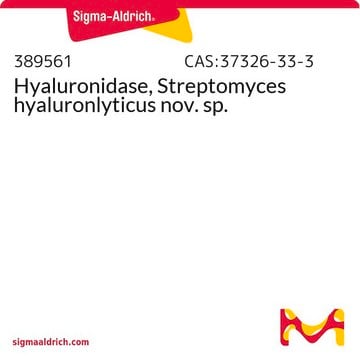H3506
Hyaluronidase from bovine testes
Type I-S, lyophilized powder, 400-1000 units/mg solid
Synonym(s):
Hyaluronate 4-glycanohydrolase, Hyaluronoglucosaminidase
About This Item
Recommended Products
type
Type I-S
form
lyophilized powder
specific activity
400-1000 units/mg solid
mol wt
~55 kDa (four subunits of 14 kDa each)
technique(s)
cell culture | mammalian: suitable
single cell analysis: suitable
application(s)
diagnostic assay manufacturing
shipped in
wet ice
storage temp.
−20°C
Looking for similar products? Visit Product Comparison Guide
Related Categories
Application
Suitable for use in preparation of single cell suspension for sequencing.
Biochem/physiol Actions
Unit Definition
Other Notes
recommended
Signal Word
Danger
Hazard Statements
Precautionary Statements
Hazard Classifications
Resp. Sens. 1
Storage Class Code
11 - Combustible Solids
WGK
WGK 3
Flash Point(F)
Not applicable
Flash Point(C)
Not applicable
Personal Protective Equipment
Certificates of Analysis (COA)
Search for Certificates of Analysis (COA) by entering the products Lot/Batch Number. Lot and Batch Numbers can be found on a product’s label following the words ‘Lot’ or ‘Batch’.
Already Own This Product?
Find documentation for the products that you have recently purchased in the Document Library.
Customers Also Viewed
Articles
Use of MULTI-seq lipid-modified oligos, protocol, and troubleshooting guide for PCR Assays and Sequencing applications.
Use of MULTI-seq lipid-modified oligos, protocol, and troubleshooting guide for PCR Assays and Sequencing applications.
Use of MULTI-seq lipid-modified oligos, protocol, and troubleshooting guide for PCR Assays and Sequencing applications.
Use of MULTI-seq lipid-modified oligos, protocol, and troubleshooting guide for PCR Assays and Sequencing applications.
Protocols
To measure hyaluronidase activity, a turbidimetric determination assay is used at 600 nm. One unit of hyaluronidase activity will cause a change in absorbance of 0.330 per minute at pH 5.35 at 37 °C.
To measure hyaluronidase activity, a turbidimetric determination assay is used at 600 nm. One unit of hyaluronidase activity will cause a change in absorbance of 0.330 per minute at pH 5.35 at 37 °C.
To measure hyaluronidase activity, a turbidimetric determination assay is used at 600 nm. One unit of hyaluronidase activity will cause a change in absorbance of 0.330 per minute at pH 5.35 at 37 °C.
To measure hyaluronidase activity, a turbidimetric determination assay is used at 600 nm. One unit of hyaluronidase activity will cause a change in absorbance of 0.330 per minute at pH 5.35 at 37 °C.
Our team of scientists has experience in all areas of research including Life Science, Material Science, Chemical Synthesis, Chromatography, Analytical and many others.
Contact Technical Service









